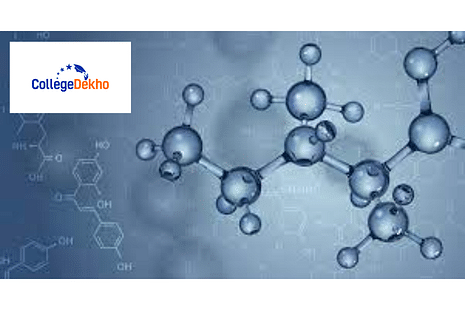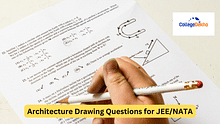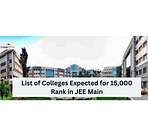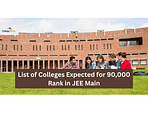
IIT JAM 2024 notification is now available on the IIT Madras official website, jam.iitm.ac.in. Students can register for IIT JAM Chemistry 2024 using their mobile number and a valid email address through the official website. Students applying for IIT JAM Chemistry 2024 must have a Bachelor's degree in Chemistry. IIT JAM is a computer-based exam with 60 questions worth 100 marks. IIT JAM Chemistry 2024 paper will be divided into 3 parts- Organic Chemistry, Physical Chemistry, and Inorganic Chemistry. Also, The IIT JAM Chemistry question paper is divided into three sections based on the exam pattern, each with a different number of questions and a different marking scheme.
JAM 2024 exam is used for admission to a variety of programmes at various institutes, including MSc, MSc (Technology), MSc-MTech Dual Degree, MSc (Research), Joint MSc-PhD, MSc-PhD Dual Degree, and Integrated PhD. IIT JAM Chemistry 2024 syllabus determines candidates' knowledge, understanding, and ability to solve problems in their fields of study. It covers a wide range of foundational principles, concepts, and applications important to each subject. Candidates can build a solid understanding of concepts and develop the necessary skills for solving exam questions by thoroughly studying the syllabus.
Check Out: IIT JAM 2024 Application Form
IIT JAM 2024 Important Dates
Candidates can check out all the IIT JAM 2024 Important dates in the table provided below:
Events | Dates |
|---|---|
IIT JAM 2024 Online Application (Release Date) | 5th September 2023 |
IIT JAM 2024 Application Form Submission (Last Date) | 13th October 2023 |
IIT JAM 2024 Admit Card Availability | 8th January 2024 |
IIT JAM 2024 Exam Date | 11th February 2024 |
IIT JAM 2024 Provisional Answer Key | February 2024 |
IIT JAM 2024 Response Sheet | February 2024 |
IIT JAM Provisional Answer Key Challenge Window | February 2024 |
Announcement of IIT JAM 2024 Result | 22nd March 2024 |
IIT JAM 2024 Final Answer Key | March 2024 |
IIT JAM 2024 Counseling Registration | April 2024 |
IIT JAM 2024 Scorecard Availability | April 2024 |
IIT JAM 2024 Admission Form Correction (Last Date) | May 2024 |
Also Check: IIT JAM 2024 Exam Preparation
IIT JAM Chemistry 2024 Syllabus
Candidates can check out the list of total chapters in IIT JAM Chemistry 2024 Syllabus which is divided into 3 parts Physical Chemistry, Organic Chemistry, and Inorganic Chemistry.
IIT JAM Chemistry 2024 Syllabus: Physical Chemistry
Topics | Sub-Topics |
|---|---|
Atomic and Molecular Structure | Planck's black body radiation, Photoelectric effect, Bohr's theory, de Broglie postulate, Heisenberg's Uncertainty Principle; Schrödinger's wave equation (including mathematical treatment), postulates of quantum mechanics, normalized and orthogonal wave functions, its complex conjugate (idea of complex numbers) and significance of Ñ°2; Operators; Particle in one-dimension box, radial and angular wave functions for hydrogen atom, radial probability distribution; Finding maxima of distribution functions (idea of maxima and minima), energy spectrum of hydrogen atom; Shapes of s, p, d and f orbitals; Pauli's Exclusion Principle; Hund's rule of maximum multiplicity. |
Gaseous State | Kinetic molecular model of a gas: collision frequency; collision diameter; mean free path and viscosity of gases; Maxwell-Boltzmann distribution: molecular velocities, law of equipartition of energy, molecular basis of heat capacities; Ideal gases, and deviations from ideal gas behaviour, van der Waals equation of state; critical state, law of corresponding states. |
Liquid State | Physical properties of Liquid, vapor pressure, surface tension and co-efficient of viscosity and their applications; effect of concentration of solutes on surface tension and viscosity; effect of temperature on viscosity of liquids. |
Solid State | Unit Cells, Miller indices, crystal systems and Bravais Lattices, elementary applications of vectors to crystal systems; X-ray diffraction, Bragg's Law, Structure of NaCl, CsCl, and KCl, diamond, and graphite; Close packing in metals and metal compounds, semiconductors, insulators; Defects in crystals, lattice energy; isomorphism; heat capacity of solids. |
Chemical Thermodynamics | Mathematical treatment: Exact and in-exact differentials, partial derivatives, Euler's reciprocity, cyclic rule; Reversible and irreversible processes; Laws of thermodynamics, thermochemistry, thermodynamic functions, such as enthalpy, entropy, and Gibbs free energy, their properties and applications; Partial molar quantities, dependence of thermodynamic parameters on composition, Gibbs Duhem equation, chemical potential and its applications. |
Chemical and Phase Equilibria | Law of mass action; Kp, Kc, Kx and Kn; Effect of temperature on K; Le-Chatelier principle; Ionic equilibria in solutions; pH and buffer solutions; Salt hydrolysis; Solubility and solubility product; Acid – base titration curves; Indicators; Dilute solutions; Raoult's and Henry's Laws and their applications; Colligative properties; Gibbs phase rule; Phase equilibria; single and two-component phase diagrams. |
Electrochemistry | Conductivity, equivalent and molar conductivity and their properties; Kohlrausch law; DebyeHückelOnsager equation; Ionic velocities, mobilities, transference numbers; Applications of conductance measurement; Quantitative aspects of Faraday's laws of electrolysis, applications of electrolysis in metallurgy and industry; Electromotive force of a cell, Nernst equation; Standard electrode potential, Electrochemical series; Concentration cells with and without transference; Applications of EMF measurements including potentiometric titrations. |
Chemical Kinetics | Order and molecularity of a reaction, differential and integrated form of rate expressions - basic ideas of integration and differentiation; Kinetics of opposing, parallel, and consecutive reactions; Steady state approximation in reaction mechanisms; Chain reactions; Uni-molecular reaction (Lindemann mechanism); Temperature dependence of reaction rates, Arrhenius equation; activation energy; Collision theory of reaction rates; Types of catalysts, specificity and selectivity, mechanisms of catalyzed reactions at solid surfaces; Enzyme catalysis (Michaelis-Menten mechanism, Double reciprocal plot), Acid-base catalysis. |
Adsorption | Gibbs adsorption equation; adsorption isotherm; types of adsorption; surface area of adsorbents; surface films on liquids |
Spectroscopy | Beer-Lambert's law; fundamental concepts of rotational, vibrational, electronic and magnetic resonance spectroscopy. |
IIT JAM Chemistry 2024 Syllabus: Organic Chemistry
Topics | Sub-Topics |
|---|---|
Basic Concepts in Organic Chemistry and Stereochemistry | Electronic effects (resonance, inductive, hyperconjugation) and steric effects and its applications (acid/base property); optical isomerism in compounds with and without any stereocenters (allenes, biphenyls); conformation of acyclic systems (substituted ethane/n-propane/n-butane) and cyclic systems, substituted cyclohexanes, and polycyclic (cis and trans decalins) systems. |
Organic Reaction Mechanism and Synthetic Applications | Chemistry of reactive intermediates (carbocations, carbanions, free radicals, carbenes, nitrenes, benzynes); nucleophilic substitution, elimination reactions and mechanisms; Hofmann-Curtius-Lossen rearrangement, Wolff rearrangement, Simmons-Smith reaction, Reimer-Tiemann reaction, Michael reaction, Darzens reaction, Wittig reaction and McMurry reaction; Pinacolpinacolone, Favorskii, benzilic acid rearrangement, Baeyer-Villeger reaction; oxidation and reduction reactions in organic chemistry; Organometallic reagents in organic synthesis (Grignard, organolithium , organocopper and organozinc (Reformatsky only); Diels-Alder, electrocyclic and sigmatropic reactions; functional group inter-conversions and structural problems using chemical reactions. |
Qualitative Organic Analysis | Identification of functional groups by chemical tests; elementary UV, IR and 1H NMR spectroscopic techniques as tools for structural elucidation of simple organic molecules. |
Natural Products Chemistry | Chemistry of alkaloids, steroids, terpenes, carbohydrates, amino acids, peptides and nucleic acids. |
Aromatic and Heterocyclic Chemistry | Monocyclic, bicyclic and tricyclic aromatic hydrocarbons, and monocyclic compounds with one hetero atom: synthesis, reactivity and properties, aromaticity; Electrophilic and nucleophilic aromatic substitution reactions |
IIT JAM Chemistry 2024 Syllabus: Inorganic Chemistry
Topics | Sub-Topics |
|---|---|
Periodic Table | Periodic classification of elements, Aufbau's principle, periodicity; Variations of orbital energy, effective nuclear charge, atomic, covalent, and ionic radii, ionization enthalpy, electron gain enthalpy, and electronegativity with atomic number, electronic configuration of diatomic molecules (first and second row elements). |
Extractions of Metals | General methods of isolation and purification of elements; Principles and applications of Ellingham diagram. |
Chemical Bonding and shapes of molecules | lonic bond: Packing of ions in crystals, radius ratio rule, Born-Landé equation, Kapustinskii expression, Madelung constant, Born-Haber cycle, solvation energy, polarizing power and polarizability; Fajan's rules; Covalent bond: Lewis structure, valence bond theory. Hybridization, molecular orbital theory, molecular orbital diagrams of diatomic and simple polyatomic molecules and ions; Multiple bonding |
Main Group Elements (s and p blocks) | Reactions of alkali and alkaline earth metals with oxygen, hydrogen and water; Alkali and alkaline earth metals in liquid ammonia; Gradation in properties of main group element in a group; Inert pair effect; Synthesis, structure and properties of diborane, ammonia, silane, phosphine and hydrogen sulphide; Allotropes of carbon; Oxides of nitrogen, phosphorus and sulphur; Oxoacids of phosphorus, sulphur and chlorine; Halides of silicon and phosphorus; Synthesis and properties of borazine, silicone and phosphazene; Synthesis and reactions of xenon fluorides. |
Transition Metals (d block) | Characteristics of d-block elements; oxide, hydroxide and salts of first row metals; coordination complexes: structure, isomerism, reaction mechanism and electronic spectra; VB, MO and crystal field theoretical approaches for structure, color and magnetic properties of metal complexes; Organometallic compounds with metal-ligand single and multiple bonds (such as metal carbonyls, metal nitrosyls and metallocenes); Homogenous catalysis involving Wilkinson's catalyst. |
Bioinorganic Chemistry | Essentials and trace elements of life; basic reactions in the biological systems and the role of metal ions, especially Fe2+, and Zn2+; structure and function of myoglobin, hemoglobin and carbonic anhydrase. |
Instrumental Methods of Analysis | Basic principles; instrumentations and simple applications of conductometry, potentiometry and UV-vis spectrophotometry; analyses of water, air and soil samples. |
Analytical Chemistry | Principles of qualitative and quantitative analysis; Acid-base, oxidation-reduction, and complexometric titrations using EDTA; Precipitation reactions; use and types of indicators; Use of organic reagents in inorganic analysis; Radioactivity, nuclear reactions, applications of isotopes mathematical treatment in error analysis, elementary statistics,cs and probability theory. |
IIT JAM Chemistry 2024 Question Paper
In today's highly competitive world, every student has the goal to do well academically to get admission in the top colleges and universities through entrance exams. One of the most common ways to understand the exam/test pattern is to solve as many previous year's question papers as possible. Previous year questions not only help a student become familiar with the exam pattern, but they also help a student gain confidence in a subject which makes it one of the most effective ways to prepare for an exam.
Students can check out the IIT JAM Chemistry previous year question papers from 2016-2023 in the link provided below:
Previous Year Question Papers | Answer Key |
|---|---|
| IIT JAM Chemistry Question Paper 2015 | -- |
| IIT JAM Chemistry Question Paper 2014 | -- |
| IIT JAM Chemistry Question Paper 2013 | -- |
IIT JAM Chemistry 2024 Topic-wise Weightage
Candidates can check out the IIT JAM Chemistry 2024 topic-wise weightage in the table provided below. With this, you can get an overview of which topic is more important and can make a schedule according to it.
Topics | Syllabus | Weightage |
|---|---|---|
Physical Chemistry | Chemical Thermodynamics | 6 |
Chemical Kinetics | 5 | |
Gaseous State | 2 | |
Liquid State | 2 | |
Solid State | 2 | |
Adsorption | 4 | |
Spectroscopy | 4 | |
Electrochemistry | 5 | |
Atomic and Molecular Structure | 4 | |
Organic Chemistry | Basic Concept of Organic Chemistry and Stereochemistry | 11 |
Organic Reaction Mechanism & Synthetic Application | 10 | |
Qualitative Organic Analysis /Spectroscopy | 5 | |
Natural Products Chemistry | 5 | |
Inorganic Chemistry | Transition metals (d-block) | 6 |
Chemical Bonding and Shapes of Compounds | 6 | |
Analytical Chemistry | 5 | |
Periodic Table | 4 | |
Extractions of Metals | 4 | |
Analytical Chemistry | 2 | |
Instrumental Methods of Analysis | 2 | |
Bioinorganic Chemistry | 2 | |
Main Group Elements (s and p blocks) | 4 |
Also Read: IIT JAM 2024 Exam Pattern
The information brochure of the Joint Admission Test for Masters (JAM) 2024 has been released by the Indian Institute of Technology (IIT) Madras. The JAM 2024 information brochure is available on the official website, jam.iitm.ac.in. The brochure is a comprehensive guide that includes information about the examination, eligibility criteria, application process, and more.
For more information and the latest updates on IIT JAM 2024 stay tuned with CollegeDekho.

















Similar Articles
CUET 2024 Physics Important Topics: Preparation Strategy, Topic-Wise Weightage
CUET 2024 Psychology Syllabus (Released): Check Topics, Pattern, Download PDF
CUET 2024 Geography Syllabus (Released): Check Topics, Pattern, Download PDF
Bihar BSc Agriculture Admission 2024: Dates, Entrance Exams, Eligibility, Application Process, Counselling Process and Top Colleges
List of Topics to Score 45+ in NEST Biology 2024
List of Courses Offered by NISER through NEST 2024